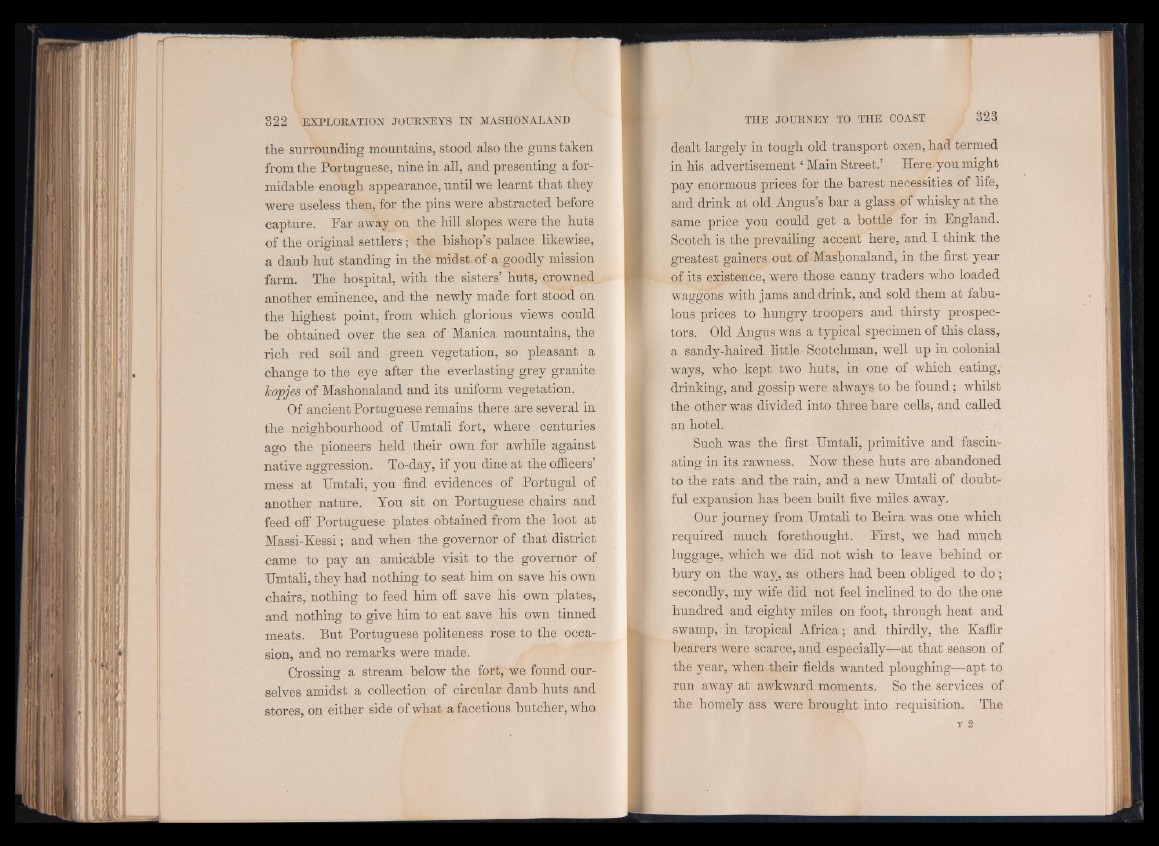
the surrounding mountains, stood also the guns taken
from the Portuguese, nine in all, and presenting a formidable
enough appearance, until we learnt that they
were useless then, for the pins were abstracted before
capture. Par away on the hill slopes were the huts
of the original settlers; the bishop’s palace likewise,
a daub hut standing in the midst of a goodly mission
farm. The hospital, with the sisters’ huts, crowned
another eminence, and the newly made fort stood on
the highest point, from which glorious views could
be obtained over the sea of Manica mountains, the
rich red soil and green vegetation, so pleasant a
change to the eye after the everlasting grey granite
kopjes of Mashonaland and its uniform vegetation.
Of ancient Portuguese remains there are several in
the neighbourhood of IJmtali fort, where centuries
ago the pioneers held their own for awhile against
native aggression. To-day, if you dine at the officers’
mess at Umtali, you find evidences of Portugal of
another nature. You sit on Portuguese chairs and
feed off Portuguese plates obtained from the loot at
Massi-Kessi ; and when the governor of that district
came to pay an amicable visit to the governor of
Umtali, they had nothing to seat him on save his own
chairs, nothing to feed him off save his own plates,
and nothing to give him to eat save his own tinned
meats. But Portuguese politeness rose to the occasion,
and no remarks were made.
Crossing a stream below the fort, we found ourselves
amidst a collection of circular daub huts and
stores, on either side of what a facetious butcher, who
dealt largely in tough old transport oxen, had termed
in his advertisement ‘ Main Street.’ Here you might
pay enormous prices for the barest necessities of life,
and drink at old Angus’s bar a glass of whisky at the
same price you could get a bottle for in England.
Scotch is the prevailing accent here, and I think the
greatest gainers out of Mashonaland, in the first year
of its existence, were those canny traders who loaded
waggons with jams and drink, and sold them at fabulous
prices to hungry troopers and thirsty prospectors.
Old Angus was a typical specimen of this class,
a sandy-haired little- Scotchman, well up in colonial
ways, who kept two huts, in one of which eating,'
drinking, and gossip were always to be found; whilst
the other was divided into three bare cells, and called
an hotel.
Such was the first Umtali, primitive and fascinating
in its rawness. Now these huts are abandoned
to the rats and the rain, and a new, Umtali of doubtful
expansion has been built five miles away.
Our journey from Umtali to Beira was one which
required much forethought. First, we had much
luggage, which we did not wish to leave behind or
bury on the way, as others had been obliged to do ;
secondly, my wife did not feel inclined to do the one
hundred and eighty miles on foot, through heat and
swamp, in tropical Africa; and thirdly, the Kaffir
bearers were scarce, and especially—at that season of
the year, when their fields wanted ploughing—apt to
run away at awkward moments. So the services of
the homely ass were brought into requisition. The
Y 2